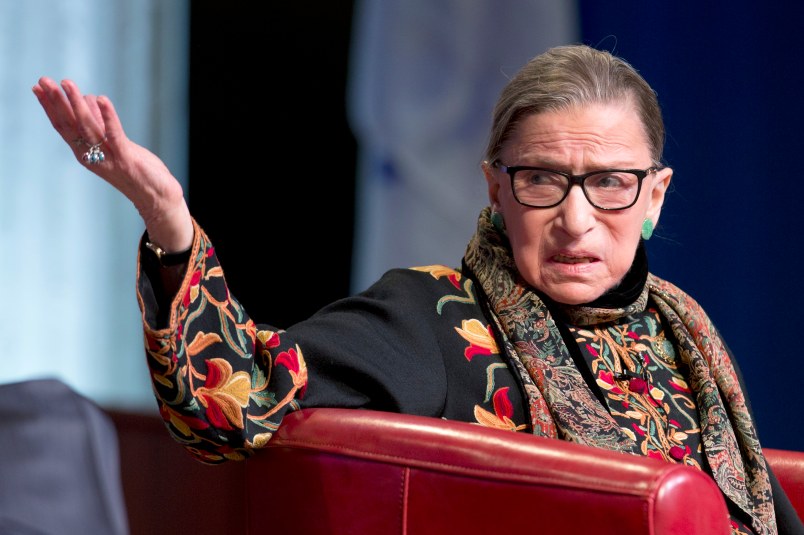Supreme Court Justice Ruth Bader Ginsburg’s criticisms of Donald Trump’s presidential campaign have landed her in the headlines and, experts say, in a big, yuuuge gray area.
Supreme Court observers told TPM on Tuesday that while no rule prevents Ginsburg from sharing her opinions on the 2016 presidential race with the media, her remarks present an unexpected break with tradition and could sow distrust by leading people to believe that the nation’s highest court is a political player.
Though American federal judges are bound to a Code of Conduct, Supreme Court justices are not bound to a formal ethics code. Chief Justice John Roberts has said that code is a “starting point and a key source of guidance” for the justices on the high court, but they have “no reason to adopt the Code of Conduct as its definitive source of ethical guidance.”
“Judges have a First Amendment right to articulate their views on the issues of the day,” Charles Gardner Geyh, a professor at Indiana University’s Maurer School of Law, told TPM. “We need to understand that when judges are more candid about their views, that itself shouldn’t cause us to lose our minds.”
Geyh said Ginsburg’s first comments on Trump, that she “can’t imagine” a Trump presidency and that “everything” would be up for grabs with him in the White House, struck him as “relatively vague, negative comments.” He added that her comments were “a reflection of Ginsburg’s candor and a certain extent a sign of the times.”
“I think that there’s an exceptional quality to Trump’s candidacy that makes it a certain type of case,” he said. “It has less to do with his policies than his manner of being.”
But he said Ginsburg’s most recent remark to CNN, that Trump is a “faker” who should release his tax returns, bordered on opposition to his candidacy.
The Code of Conduct that, again, isn’t binding for Supreme Court justices, states that judges should not “make speeches for a political organization or candidate, or publicly endorse or oppose a candidate for public office.”
“She is as close to the line as humanly possible that we might not want to see our justices, who are objective and above the law, cross,” said Timothy R. Johnson, professor of political science and law at the University of Minnesota.
Given that no rule forbids justices from weighing in on the election, experts say there wouldn’t necessarily be any repercussions for her frank comments—unless an election between Trump and Democrat Hillary Clinton had to be settled by the Supreme Court, à la Bush v. Gore.
“I don’t see how she could sit on the case,” said Russell Wheeler, visiting fellow of governance studies at the Brookings Institution. “I don’t think it’s very likely, but they didn’t think Bush v. Gore was very likely.”
Geyh argued there’s a difference between criticizing a president and criticizing the prospect of that person being president. It’s a distinction that seems to separate Ginsburg from previous Supreme Court justices who also have commented on Presidents and presidential races.
Justice Sandra Day O’Connor muttered, “this is terrible” after the state of Florida was called for Al Gore in the 2000 election, according to Newsweek. But she reportedly made that comment at a party while she was among friends and family.
Thurgood Marshall, the nation’s first black justice, made it clear that he didn’t miss having Ronald Reagan in the White House.
“I wouldn’t do the job of dogcatcher for Ronald Reagan,” Marshall said in an interview in 1989, two years before he retired from the bench, according to The New York Times. A year later, Marshall was candid about his thoughts on President George H.W. Bush: “It’s said that if you can’t say something good about a dead person, don’t say it. Well, I consider him dead.”
Wheeler recalled what is perhaps the most similar example of a sitting justice criticizing a President: in 1916, Supreme Court Justice Charles Evan Hughes said Woodrow Wilson wasn’t a good commander-in-chief and eventually became so discouraged by the campaign that he left the high court to run as the Republican nominee against Wilson. Hughes lost.
John Maltese, a professor of political science at the School of Public and International Affairs at the University of Georgia who’s written extensively about how 2016 candidates have criticized Supreme Court decisions, argued it was dangerous both for presidential candidates to criticize the courts and for justices to criticize the candidates. Maltese said that such a cycle of negativity could “erode” America’s governmental balance.
“The court can’t do anything by itself. It’s very important they be seen as a legitimate institution and if the perception is that the court is just yet another political actor, the court’s legitimacy is undermined,” he told TPM. “The likelihood people would follow the court’s decision is undermined.”
Correction: This post has been updated to reflect that Sandra Day O’Connor reportedly said it was “terrible” when the state of Florida was called for Al Gore.










